The beneficial properties and contraindications of linseed oil were well known to our ancestors. Once this product was considered ordinary and was constantly present on tables at residents of central Russia and most regions of Europe. But in recent years it has been undeservedly forgotten. However, with the return of fashion to all useful things, the popularity of linseed oil began to quickly gain momentum.
This is a truly unique and indispensable product. A real cocktail of youth and health. No vegetable oil can compare with it in biological value.
Material Content:
Useful properties of linseed oil
Flax seed oil consists of 90% of the essential polyunsaturated fatty acids that are not synthesized in our body. We can only get them from food.
The largest share falls on linolenic acid (44-61%). In the literature, it is often found under the name Omega-3. From 16 to 30% of the volume is linoleic acid (Omega-6) and about the same amount of oleic acid (Omega-9).

In the diet of modern man there is a clear lack of Omega-3. It was found that a few generations ago, people had fewer chronic diseases. This shows a direct connection with food.
Previously, the ratio of Omega-3 and Omega-6 in daily consumption was 1: 1. Currently, this proportion has shifted towards linoleic acid and now equals 1:20. Such a bias is responsible for the recent multiple increase in cardiovascular diseases.
Qualitative Omega-3 people can get only from oilseeds and valuable types of oily fish. But the disadvantage is easily covered by the consumption of linseed oil. Linolenic acid has several spatial forms, and it is in this product that it is contained in the most preferred form.
Fatty acids are part of the cell walls, are transport agents, and are involved in many oxidative processes.
Their role is great in the work of the nervous, endocrine and cardiovascular systems. Without them, transmission of nerve impulses and the synthesis of hormones are not complete.
They participate in the activity of the endocrine glands. The condition of the mucous membranes of the digestive tract, lungs, and bronchi depends on their presence.

Omega-3,6 and 9 acids have a number of useful properties:
- regulate the activity of the central nervous system, improve brain function, participate in the transmission of a signal impulse, build a connection between the center of nervous activity and the controlled organs;
- have a relaxing effect, relieve nervous tension, improve concentration, memory and performance;
- reduce blood viscosity and stress on the heart, prevent the deposition of large cholesterol molecules on the walls of blood vessels, restore heart rate, normalize blood pressure, increase the elasticity of blood vessels and capillaries;
- participate in the renewal of the mucous membranes of the digestive tract, promote the healing of damaged integuments, and restore intestinal motor activity;
- have a direct effect on fat metabolism, metabolism, maintain normal body weight;
- consumed in the synthesis of sex hormones, regulate the reproductive system.
In addition, linseed oil contains a lot of vitamin E, which protects the body from the action of free radicals, slows down aging. Promotes skin renewal, hair growth and strengthen nails.
Vitamin A is useful for immunity, it is also needed for vision correction. Vitamin K plays an important role in the formation of platelets.
Flaxseed oil inhibits the growth of cancer cells, has a slight anti-inflammatory effect. It envelops the walls of the stomach, promotes the regeneration and restoration of tissues. Gently stimulates diuresis. It has a laxative effect.
Special benefits for women
Flaxseed oil contains lignans - estrogen-like plant substances that can balance female sex hormones. They act on the body softer than drugs with similar properties of animal or synthetic origin and, unlike the latter, do not show a carcinogenic effect, i.e. Do not provoke tumor growth.
It is interesting:linseed oil

The benefits of flaxseed oil for women is determined by the presence of B vitamins and phytosterols in it, which are involved in the work of the endocrine system. Vegetable fat-like substances are consumed in the synthesis of sex hormones and maintain normal reproductive function.
The same components ensure the stability of the emotional background. Flaxseed oil is useful to add to food during the period of extinction of ovarian activity, when a woman experiences physical and mental discomfort. Plant hormones help to survive this period most evenly.
Lignans are useful in severe premenstrual syndrome. Flaxseed oil has a beneficial effect on the psyche, and also somewhat alleviates the symptoms of painful periods.
Fatty acids are involved in the formation of the nervous system of the fetus, positively affect the formation of the heart and blood vessels. Drinking oil during pregnancy reduces the risk of varicose veins in the expectant mother.
The use of linseed oil gives visible positive results. Representatives of the fair sex note a change in the condition of the skin.
With prolonged use, dryness and peeling pass. The quality of hair and nails is noticeably improving.
What diseases does it help?
Flaxseed oil is used for diseases of the heart and blood vessels. It is useful for hypertension, coronary artery disease, arrhythmias, varicose veins.
Flax seed oil is a good remedy for the prevention of thrombosis and atherosclerosis. It is used to lower cholesterol, cleanse the liver, and normalize the process of blood formation.
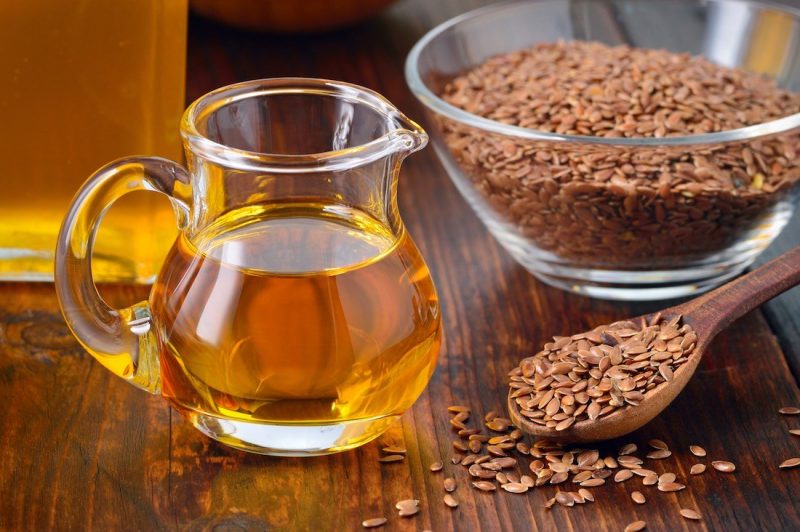
This product is suitable for diseases of the gastrointestinal tract: stomach ulcers, gastritis, colitis. Flaxseed oil relieves intestinal colic, helps with constipation and flatulence.
Product components prevent salt deposition. Oil is used to prevent the formation of kidney stones. It is also effective for inflammatory diseases of the joints and bladder.
A natural remedy is used for diseases of the thyroid gland, impaired fat metabolism, sexual dysfunction, menopause, female and male inflammatory diseases. This product is used to prevent breast cancer. It inhibits the growth of abnormal cells during the development of oncology.
The tool is effective in the treatment of ENT diseases. It is taken to enhance health in bronchitis. The oil restores the mucous membrane of the respiratory organs, improves the secretion.
Squeezing flax seeds is useful in childhood. Omega-3 and 6 acids are involved in the formation of the nervous system of a young body. Oil should be consumed in attention deficit disorder. It helps to balance motor and mental activity.
The natural product is used as a general strengthening agent. Fatty acids, a complex of vitamins and minerals together increase immunity and help to resist infections.
The use of flax oil in cosmetology
Flaxseed oil is added to homemade cosmetics, as well as various creams, shampoo masks and industrial balms. It is universal. Suitable for any skin type.
Most often, products with linseed oil are intended for dry and brittle hair. These tools restore the rod along the entire length. Prevent excessive loss. They retain their density, give hair shine and elasticity.
Masks and face creams help get rid of dryness and peeling. Flaxseed oil gently cares for mature skin. It nourishes and restores, smoothes out fine wrinkles.
The tool has an antiseptic effect. It is applied to the skin in order to treat acne, wounds resulting from cuts, burns, frostbite.
Useful properties for weight loss
The complex of flaxseed oil substances is involved in many metabolic processes. A good metabolism helps to normalize weight. Moreover, linseed oil helps how to lose weight and get better.

Omega acids work in the name of a beautiful figure. They break down excess lipids into simple substances and thereby prevent the deposition of fat. Tocopherols and B vitamins help the assimilation of food and the timely disposal of decay products. With normal digestion, extra pounds do not linger.
However, to reduce weight, just taking oil is not enough. It is necessary to maintain physical activity and observe nutritional standards.
How to take linseed oil?
Flaxseed oil is a very active agent. It must be used carefully, starting with small doses. For the first dose, half a teaspoon will be enough. Further, according to the sensations. If everything is in order, then the next time you can drink a whole spoon.
In order to improve the health, take oil on a teaspoon 1-2 times a day with meals. You need to drink the product, and then seize it with something non-hot.
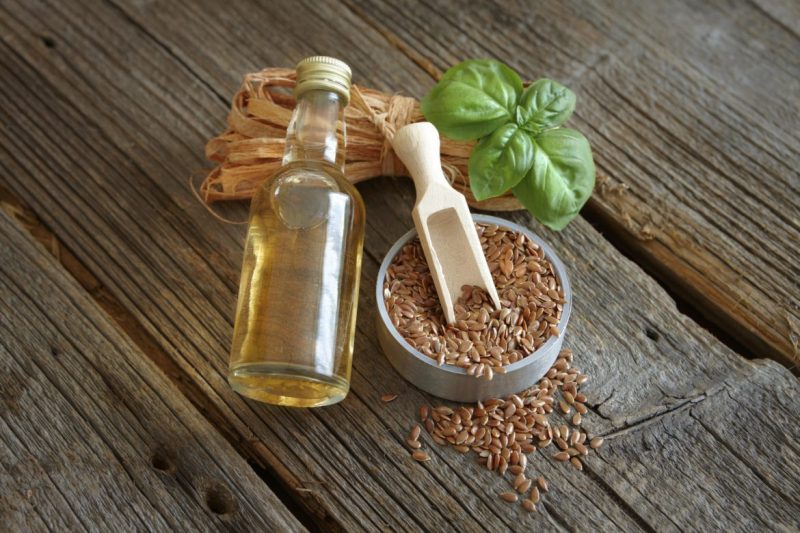
If the product tastes unpleasant, then it can be added directly to food. It is allowed to mix oil with salads, cereals, cottage cheese, yogurt, cold soups. Food should not be scalding or too cold, otherwise the oil will lose its properties.
For weight loss, the product is taken according to a different scheme. Also start with half a teaspoon.For a week, the dose is increased to a tablespoon. This norm is used 2 times a day: in the morning 20 minutes before breakfast and in the evening a quarter of an hour after dinner. The tool is washed down with a small amount of water at room temperature.
In addition to the main two meals, a tablespoon of oil is added once to food. In general, no more than 3 tablespoons of the product can be eaten per day.
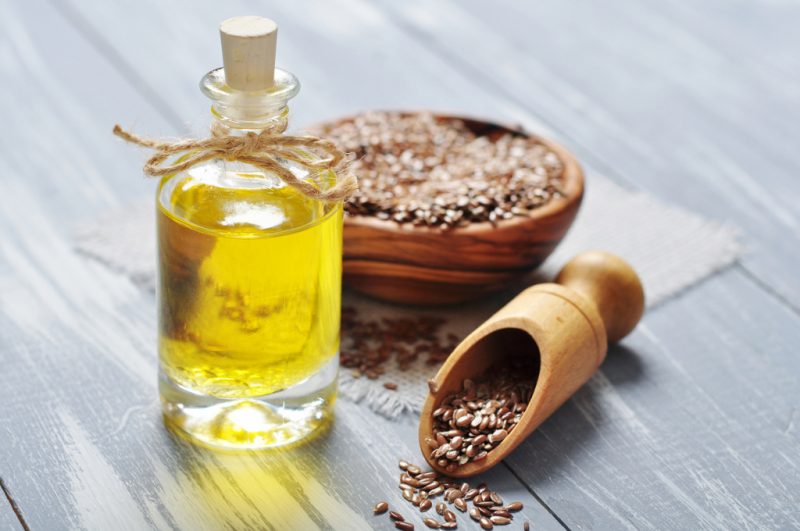
To strengthen health, prevent and treat chronic diseases, oil is taken for 1-2 months. In order to reduce weight in the absence of negative reactions and contraindications, the course is extended to 2-3 months. In total, such treatment can be practiced 1-2 times a year.
Can I use it on an empty stomach?
Not everyone likes the taste of linseed oil, therefore, to improve perception, to avoid nausea and aversion, it is recommended to drink it with food. It is perfectly absorbed along with products.
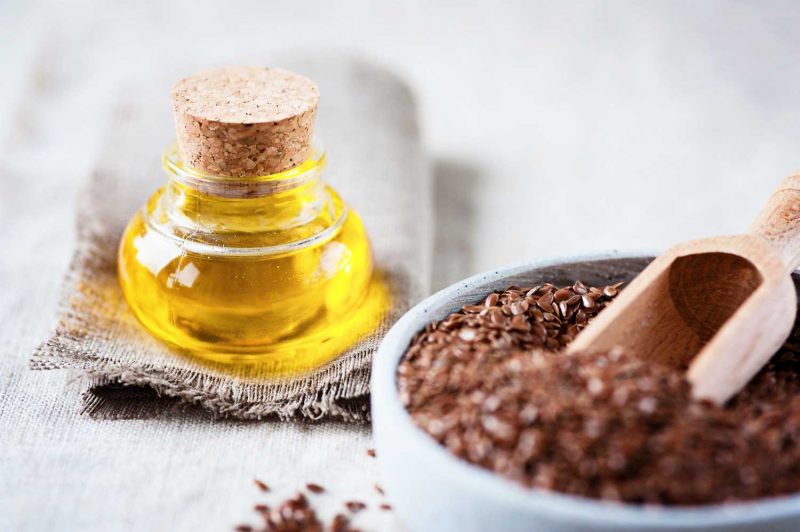
But if oil is used as a means for losing weight, then it is taken on an empty stomach. It accelerates the production of bile, prepares the intestinal tract for digestion, and also with this use has a mild laxative effect.
How to choose and store linseed oil?
The best quality is considered to be cold-pressed oil. If the seeds do not heat up during processing, then all valuable substances remain intact.
In the best case, the packaging indicates that the wooden presses were used in the spin cycle. The absence of contact of oil with metal ensures the preservation of all its properties.
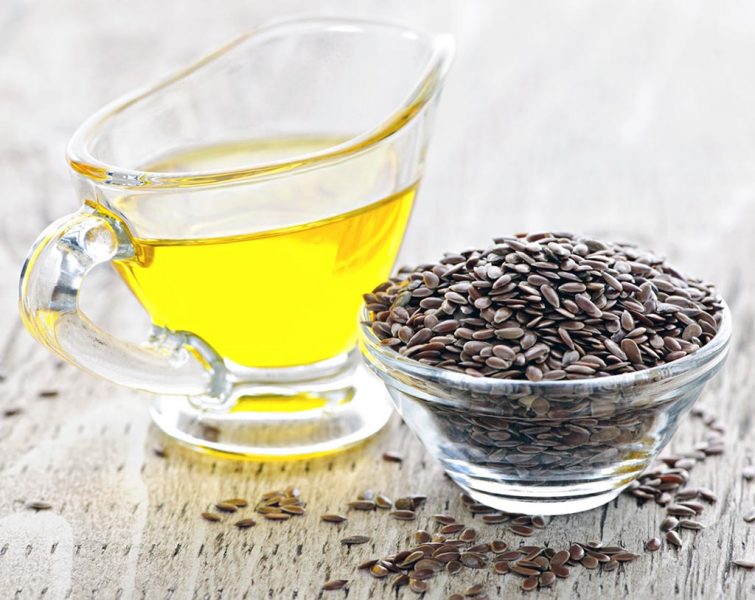
The product must be protected from sunlight, so it is packaged in a container of dark glass or opaque plastic. Both options are valid.
Do not pay attention to "enriched" (Omega-3, vitamin E, etc.) products. Flaxseed oil itself is rich in these ingredients. Such inscriptions on the packaging are nothing more than an advertising move. In such cases, the manufacturer simply unreasonably inflates the price.
Flaxseed oil oxidizes very quickly in air, so it must be stored in a tightly closed bottle. The product should be protected from direct sunlight. The optimum storage temperature is 5̊-22̊С. If the house is hot enough, it is better to put it in the refrigerator.
You can buy flaxseed oil capsules at the pharmacy. They are convenient for those who cannot tolerate the specific smell and taste of the product. Capsules are stored exclusively in the refrigerator.
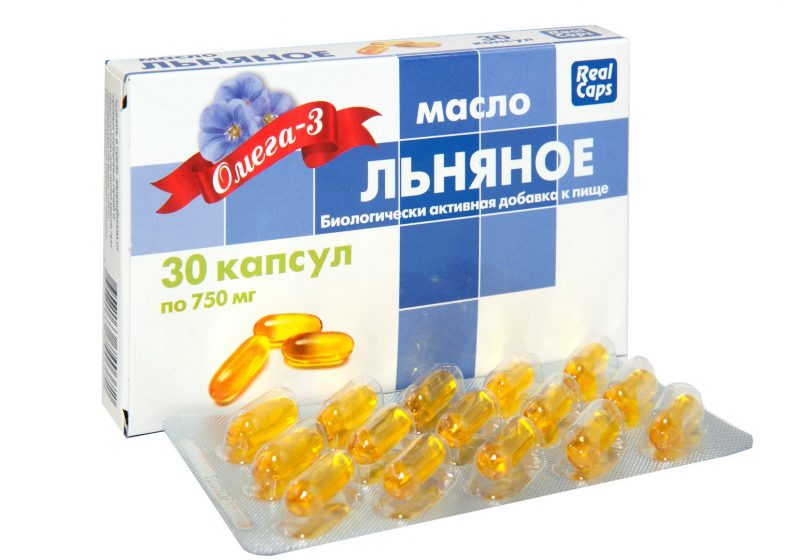
After opening the package, liquid oil should be consumed within 2 weeks. It spoils very quickly. Ketones, aldehydes, epoxides appear in rancid oil. Such a product is unsafe for health. When it is used, symptoms characteristic of an LCD (gastrointestinal infection) appear.
Flaxseed oil cannot be used for cooking hot dishes. Under the influence of high temperatures, carcinogens (substances that provoke the appearance of tumors) are formed in it.
Contraindications and possible harm
The most common contraindication is individual intolerance. In rare cases, the oil causes allergies. Subject to the rules of use, as a rule, does no harm.
Due to the high content of phytohormones in oil, pregnant women should consult with a leading doctor about the safety of such a treatment.
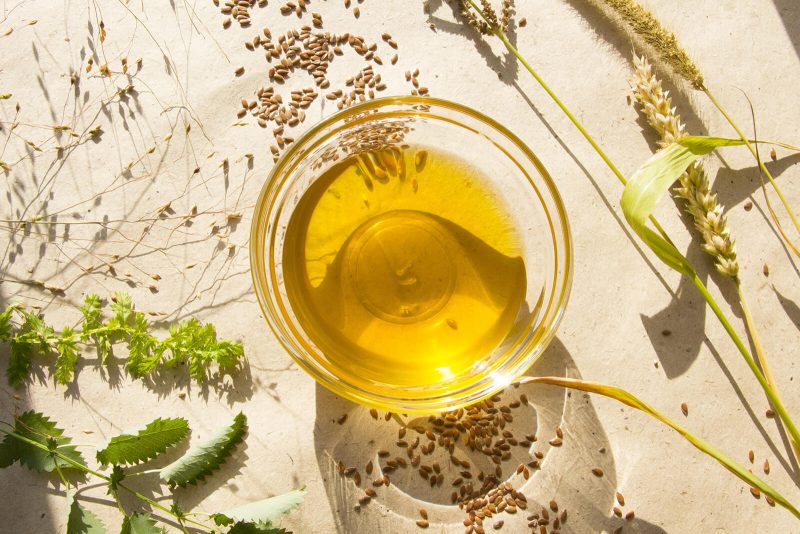
Oil stimulates the production of gastric juice, so patients with high acidity should abandon its use in its purest form. It also has a choleretic effect and can harm people with impaired biliary tract and stones in the gallbladder.
Flaxseed oil is a valuable, natural and undeservedly forgotten product. Subject to the rules of use and storage rules, it can be of great benefit.












